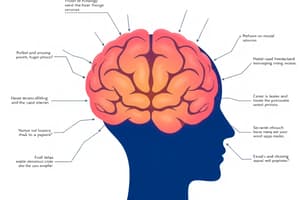Podcast
Questions and Answers
What does Psychodynamic theory primarily focus on?
What does Psychodynamic theory primarily focus on?
- Environmental determinism
- Hierarchy of needs
- Id, ego, superego and free association therapy (correct)
- Information processing model
Who is associated with Behavioral theory?
Who is associated with Behavioral theory?
B.F. Skinner
What is the highest achievement in Humanistic theory according to Abraham Maslow?
What is the highest achievement in Humanistic theory according to Abraham Maslow?
- Deterministic input-output model
- Hierarchy of needs
- Self-actualization (correct)
- Environmental determinism
What does Cognitive theory compare the human mind to?
What does Cognitive theory compare the human mind to?
Eclecticism advocates for an overarching theory in psychology.
Eclecticism advocates for an overarching theory in psychology.
Who is the key figure associated with Structuralism?
Who is the key figure associated with Structuralism?
What does Postmodernism say about truth?
What does Postmodernism say about truth?
Flashcards are hidden until you start studying
Study Notes
Psychodynamic Theory
- Developed by Sigmund Freud, emphasizing the id, ego, and superego.
- Focuses on the unconscious mind, which is seen as hedonistic and self-centered.
- Suggests a deterministic view, implying limited agency for individuals.
Behavioral Theory
- Associated with B.F. Skinner, highlighting environmental determinism.
- Proposes that human behavior is shaped by conditioning, similar to animal behavior.
- Emphasizes the impact of past experiences on current choices.
Humanistic Theory
- Founded by Abraham Maslow, introducing the hierarchy of needs.
- Positions "self-actualization" as the ultimate personal achievement.
- Advocates for a biologically-based determinism where conditional positive regard influences choices.
Cognitive Theory
- Inspired by Alan Turing’s concept of the mind as a computer.
- Utilizes the information processing model, expressing a cause-and-effect relationship.
- Describes cognitive functioning in terms of input leading to output.
Eclecticism
- Lacks a singular overarching theory, integrating diverse approaches and methods.
- Adopts a practical perspective by using effective techniques from various practices.
- Recognizes agency as relative, depending on context and situational factors.
Structuralism
- Associated with Jean Piaget, defines structures as wholes with self-regulatory properties.
- Proposes that individuals cannot escape societal or developmental structures.
- Influenced by theories from figures like Karl Marx regarding societal determinants.
Postmodernism
- Rejects the concept of absolute truth, embracing a relativistic framework.
- Views individuals as existing within specific contexts that inform their actions and beliefs.
- Advocates for a form of contextual agency, promoting the idea of free will within certain limitations.
Studying That Suits You
Use AI to generate personalized quizzes and flashcards to suit your learning preferences.




